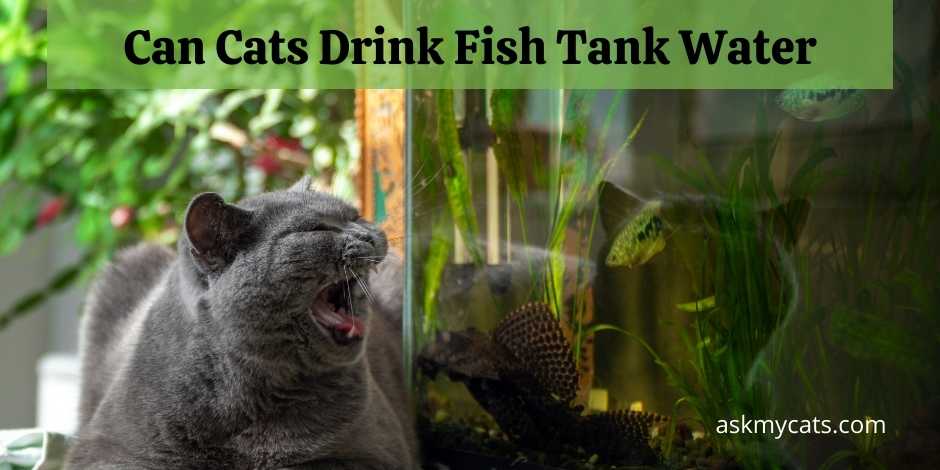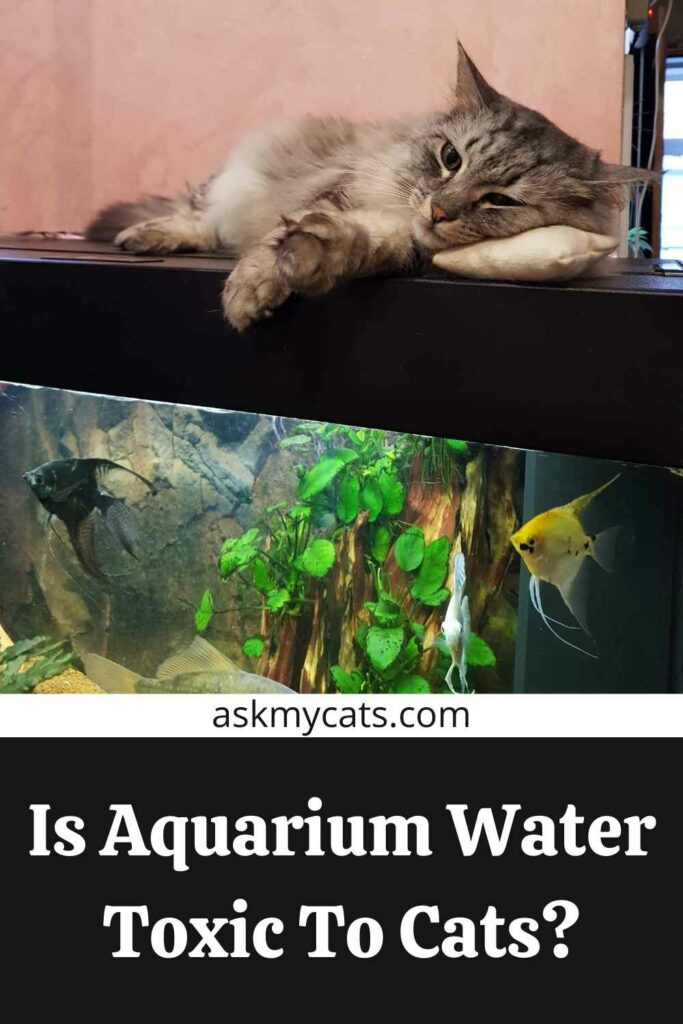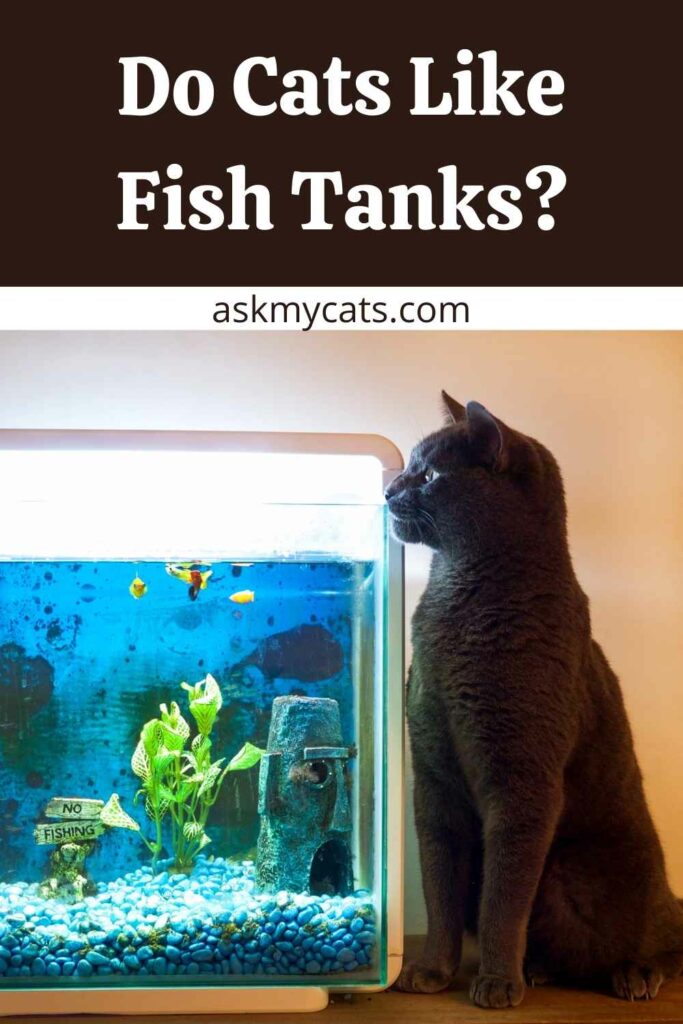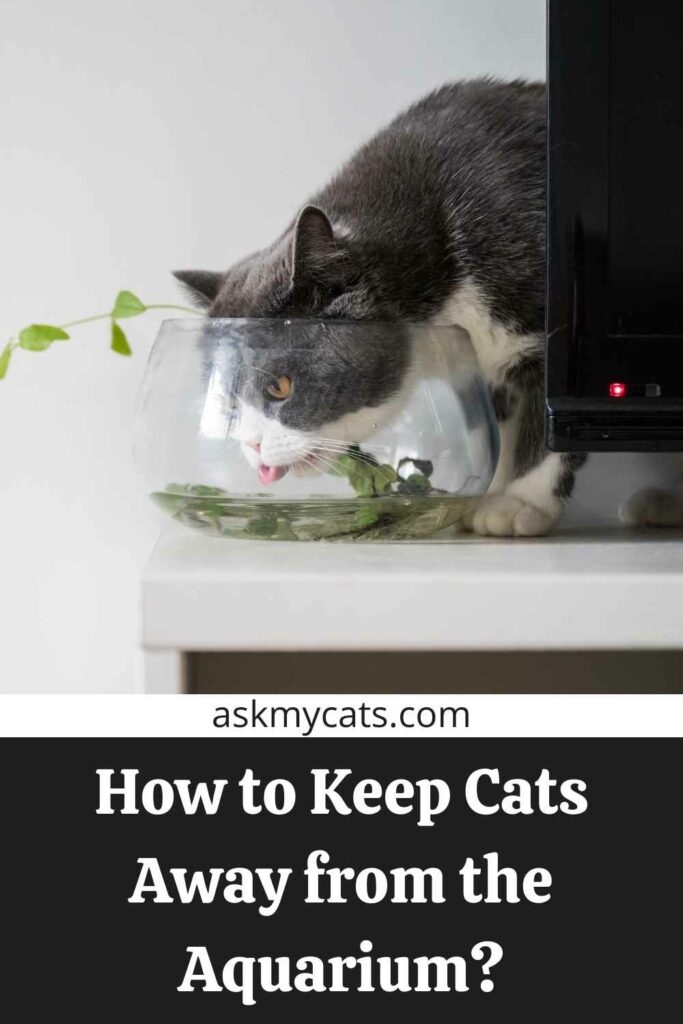If you have a fish tank in your house, your cat is almost certain to have tried to attack it at least once. Strangely enough, cats do not harm the aquarium’s fish; in fact, they are more fascinated with drinking water from it.
No, cats are unable to consume fish tank water and should not do so. People who have fish tanks and cats in their houses know how much cats like knocking off the aquarium cover and drinking the fish-scented water.
Fish tanks are a cat’s obsession. Cats, like humans, like watching the fish swim past. Cats, on the other hand, are generally jumpy, energetic, and interested by nature.


Give Your Cat the Perfect Day
Get the Free Ebook!
Is Aquarium Water Toxic To Cats?
Aquarium water contains a large number of chemicals and germs that are harmful to your cat.

Maintaining a fish tank is a difficult undertaking, especially if it contains a large number of fish and corals. Water quality fluctuates from time to time.
A cat can become ill if they consume water that includes certain poisons.
The nitrogen cycle in aquariums affects how the fish waste is handled. The waste from the fish is discharged as ammonia, which is extremely harmful to all living things.
When ammonia in the water reacts with bacteria in the aquarium filter, gravel bed, and other things, nitrite (NO2) is formed which is just too deadly.
This nitrite then combines with other bacteria to become nitrate (NO3).
Nitrate does not damage aquatic species, but it does harm humans and animals. If cats are exposed to nitrates for an extended length of time, they might get nitrate poisoning. Despite the fact that such occurrences are uncommon, nitrate poisoning is extremely serious and can result in death.
If cats drink nitrate-laced water, they may develop gastrointestinal and cardiovascular issues. Toxicity symptoms appear after the second or third exposure.
When cats drink water from the fish tank, they are ingesting nitrates, which can be harmful to their health.
The water in a fish tank is not only filthy, but it also has a changing pH level and a high overall hardness, making it unfit for your cat.
Because the biological and chemical qualities of aquarium water change over time, the pH level fluctuates. If the pH of the water exceeds 8.5, it is classified as alkaline, which is harmful to people and animals.
If the pH of the water is less than 6.0, it is called acidic, which is dangerous.
Due to the decomposition of organic material, the pH level of an aquarium is generally low. This indicates that the majority of aquarium water is acidic.
As a result, this water is harmful to your cat, as acidic water can induce vomiting, diarrhoea, renal or liver damage, and stomach pains.
The amount of calcium, magnesium, and other ions in the water is determined by its hardness.
Because aquarium water contains aquatic creatures and plants, it is subjected to a variety of biological and chemical changes throughout time.
It is possible that your cat will develop health problems if it is exposed to unfiltered hard water.
Is It Bad For Cats To Drink Fish Bowl Water?
It is bad for cats to drink fish bowl water because large amounts of uneaten fish food are frequently left over in fish bowls, contaminating the water with ammonia and nitrite.
Until aquarium water is cleansed, it includes significant quantities of carbonates and bicarbonates.
Meanwhile, drinking that water might create digestive and respiratory problems in your cat.
Carbonates and bicarbonates do not pose a major health risk to cats, but they can develop difficulties over time.
The uneaten fish food makes the water harmful for everyone who comes into contact with it, whether human or animal. Because ammonia, phosphate, and nitrite are harmful to cats’ bodies, they may suffer major health problems if they consume that water.
In addition, uneaten fish food produces poisonous ammonia and phosphate, which promotes algal development. The degradation of the fish food consumes oxygen from the water tank, lowering the total oxygen level in the tank.
The process also produces carbon dioxide, which carbonates the water. Because uneaten fish food particles block the filter, circulation in the aquarium is restricted, allowing more germs to accumulate.
We can only think how dangerous everything is for our cat if she drinks the tainted fish tank water. If cats consume polluted water, they may have difficulties with their kidneys, liver, internal organs, and respiratory system.
To avoid this, keep your fish tank free of germs and maintain the aquarium water quality to ensure the safety of every fish. Additionally, you might attempt to keep your cat away from the aquarium.
Do Cats Like Fish Tanks?
Cats like fish tanks because they are attracted to the little fishes swimming across the water.

The eyesight of cats is built to respond to input. Bright colours and fast motions are examples of this. The more unusual the fish in your home, the more fascinated you will be by an aquarium.
Multiple fish, in particular, will peak a cat’s interest on a regular basis. Small, jerky movements are used by swimming fish. From the corner of a cat’s eye, this will be noticed. The cat will next investigate, finding the aquarium’s many inhabitants.
Your tank may need to be heated depending on the fish you maintain. If this is the case, the temperature will rise. This will help a cat feel at ease on the lid of a fish tank. Your cat may relax atop the fish tank and bask in the warmth it gives.
While this will be a pleasant break from the cold, it should be avoided. It’s possible that your cat will fall into the tank or startle the fish. There’s also the possibility that the cat’s skin will get burned as a result of the extended exposure.
During the cooler months, make sure your cat has an alternate, adequate heat source. Blankets and hot water bottles will serve the same purpose as an aquarium lid’s heat.
Your cat will hear the continual flow of fresh water if it continues to drink from a fish tank. Drinking from there appeals to the cat since it gives the impression of freshness. Cats despise drinking from a basin of motionless water.
By sipping from the aquarium on a regular basis, the cat will terrify the fish. The cat might also become ill if it ingests stagnant water or fish excrement.
Provide your cat with an alternative to the sound of flowing water, such as a water fountain.
Can My Cat Get Sick After Drinking Fish Tank Water?
Yes, your cat can get seriously ill after drinking fish tank water.
Reasons Cats Should Not Drink from a Fish Aquarium
Bacteria, ammonia, nitrate, and other substances can be found in fish tank water. These toxins might not be as dangerous to fish as they are to other animals like cats.
Cats’ faces come into touch with aquarium water when they try to consume it. Skin irritation and rashes can be caused by algae growth, ammonia, and water hardness levels.
Exposure to toxic water can raise the odds of skin rashes in cats, which are already susceptible to a variety of skin illnesses owing to microorganisms in their fur.
Furthermore, if a cat climbs to the top of the aquarium and attempts to drink water directly from it, it may drop hair into the tank, which can be harmful to the fish.
Cat infections are difficult to identify, which is another reason why cats should not drink aquarium water.
This means that even if your cat has a problem or is infected with germs, it’s nearly hard to notice until things become worse. Even a veterinarian finds it difficult to study and determine the amounts of poisons in a cat’s body.
How to Keep Cats Away from the Aquarium?
If your cat won’t stay away from your tank or aquarium, you’ll need to take precautions like relocating the aquarium to ensure that he doesn’t drink the water.

The fact is that the cat will attempt to track down the fish and locate the aquarium somewhere in the home. As a result, concealing your aquarium is not an option.
You must cat-proof your fish tank if you maintain these two species as pets. This is mostly to safeguard your fish. The fish become more stressed as the cat stalks the aquarium. It’s possible that the cat will start hunting.
Your cat may be in danger if it falls into a fish aquarium. Although drowning is improbable, the cat will become wet. If the cat does not flee and dry off, hypothermia may result.
A cat will climb on top of a fish tank if given the opportunity. The more complex this assignment becomes, the less likely a cat is to do it.
Keep your tank as near to the ceiling as possible. You’ll need to get access without using a stepladder. It will be kept out if the space is too small for a cat to get through. Cats like to be in small areas, but there are certain limitations.
Also, make it difficult for your cat to get atop the fish tank. This necessitates a reduction in the number of launch pads. There should be no furniture around the aquarium. Cats will climb on sofas or armchairs. A cat can only go so far with a standing leap.
As soon as the lid is in place, double-check that it is secure. You can tape down the lid if it has air holes and feeding openings. Use electrical standard tape that is robust. Make it hard for a cat’s claws to cut the tape.
You might also want to consider putting some weight on the lid. Cats can knock things over for a variety of reasons. This may be harmful for your cat, fish, and family, whether by mistake or deliberately.
In the fish tank, place netting beneath the cover. If your cat does manage to open the top, it won’t be able to swipe the fish inside. However, this will not alleviate the anxiety caused by the presence of a cat.
Frequently Asked Questions
Is an aquarium good for cats?
Cats have the ability to catch and kill fish, as well as stress them out. Fish interest cats, and they love observing them, which is OK. They shouldn’t be closer than two feet away from the tank, though. The cat will not be able to paw at the tank or otherwise stress the fish if it is kept at that distance.
Do cats eat fish in bowls?
Goldfish for cats may be purchased to keep your pet interested and cognitively active, but make no mistake: some cats will eat fish.
Can I have a fish tank with a cat?
Cats are naturally curious, and unfortunately for fish owners, nothing appeals to them more than a fish tank. Fish tanks are a great source of vibrant colours and movement, which most animals, especially cats, find appealing.
Final Words
Keep in mind that aquarium water is very hazardous and should not be consumed by your cat. If your cat refuses to stay away from your aquarium, use the strategies listed above.
If you have any questions, ask us in the comments section below.
